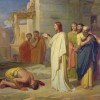In the gospel, Christ calls out to us with the words, “Be perfect as your Father in heaven is perfect.” This is a troublesome text, no doubt, in that it evokes us an uneasy bewilderment. We read it and ask ourselves, “Is perfection something that is attainable for us as human beings living in this broken world? And if so, what is the nature of this perfection, and how is it to be acquired?” In order to answer these questions it is necessary for us to examine the following affirmations.
The first of which is that in terms of absolute perfection, we know of only One Who is the living embodiment of all righteousness and holiness and goodness: Jesus Christ, the Wisdom, Word, and Power of God, revealed to us from the Father and in the Holy Spirit – through His suffering and death upon the cross.
As Orthodox Christians, we confess this at every Eucharist with the words “One is holy, one is the Lord, Jesus Christ, to the glory of God the Father.” We are reminded of this in the gospel, where at one point, a rich young Jewish Ruler came to the Lord in order to test Him and flatter him by saying, “Good teacher, what must I do in order to inherit eternal life?” To which Christ replied with another question, “Why do you call me good? There is only One Who is good, and that is God alone.” So, that which we see in Son in terms of His holiness, power, wisdom, beauty and infinite love, is the full revelation of the Father’s own perfection. Everything that the Father is, the Son has made known to us by the outpouring of the Holy Spirit.

Now of course our first inclination as Orthodox believers is to say, basically, “Well, of course, this is something we have known all our lives. From the time of our childhood, this is exactly what we have confessed over and over in the Nicene Creed. So why emphasize the point”?
We do so because the fact of the matter is that as fallen human beings we need to be reminded of one thing: that only God is God and that only God is good, and that we are unequivocally neither. God and His goodness are what we are not. Once again, many people would say, “OK, but why state the obvious? One doesn’t need to be a theologian in order to know that human beings aren’t divine.” Yet, according to the Fathers of the Church, the great tragedy of the human race is that deep down, we both assume and think and behave otherwise. In the Garden of Eden, when the serpent came to Eve and tempted her he said, “Do you really think you will die if you partake of the forbidden fruit? No, instead, if you eat it you will become like god, knowing good and evil.” In our fallen, human condition, this is what we do: we pretend to be divine by being self-autonomous and self-sufficient. Everything that is wrong with our world has to do with this singular delusion that has overtaken the human race from the very beginning. So this, again, is the first point, that God is God and we are not.
This leads us to our second point, which is very much related to the first. As Orthodox Christians, we DO believe that perfection is possible for us as human beings as long as we understand it in its proper, dynamic sense. For even though we begin our repentance by confessing that only God is God, we are taught that we have each been created to have a share in God’s own holiness through the divine energies of grace. We are made for Theosis, for the deification (“divinizing”) of the totality of our being, body, mind, heart, and soul.
And here is the whole thing in a nutshell. All that this means is that God has made us for Himself, to have a share in His very own life, so that by grace we might “become partakers of the divine nature” as the Holy Apostle Peter says. To be a Christian, then, means to experience the perfection of Theosis, not as something static, (i.e., from a pseudo-moralistic stance), but as something that is an ongoing, continuous mystery. Each of us must seek after the righteousness of our Lord by being transformed from “one degree of glory to another,” as St. Paul so beautifully writes in his 2nd letter to the Corinthians. Each of us must acquire the divine virtues by overcoming their corresponding passions (for every passion is nothing else but a failed virtue). So this is the second point, that God has, indeed, called to us to His perfection through the mystery of deification.
The third and final point that we must elucidate pertaining to perfection simply has to do with the doing of God’s will. The witness of the all the saints is that the only way for us to become fully deified is to accomplish God’s own will. For example, in the book of Hebrews, we find an astonishing statement that as our High Priest, Jesus was “made perfect” by submitting His will to the will of the Father. Again, in the gospels we have the words, “For I have come, not to do my own will, but the will of my Father Who is in Heaven.” This is why Christ also gives us the same teaching in the Lord’s prayer, “Our Father, Who art in heaven, hallowed by Thy name, Thy Kingdom come, Thy will be done.” Here we see how the will of God and the Kingdom of God are thus one and the same – in that they are totally and absolutely synonymous. To become perfect, therefore, by having a share in God’s own life by grace and by attaining the virtues, means ultimately, to put to death our own self-will by taking up our crosses and following the Lord.
The greatest tragedy of our age is that our calling to perfection in Christ is viewed as being “out of reach” for some (“But Lord, who then can be saved?”) or too foolish for others (“For the word of the cross is folly to those who are perishing, but to us who are being saved it is the power of God.”) But for those who us who have come to know what it means to be completely and uniquely human, there is no other alternative than to believe that we can be changed into something far greater than we presently are.
This is the greatest of all our Lord’s promises.














